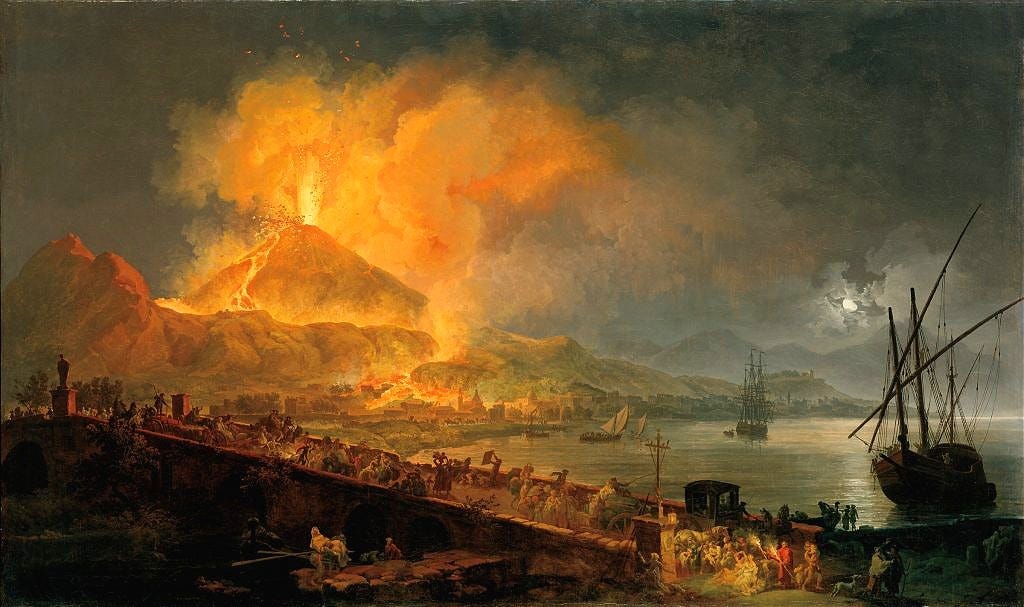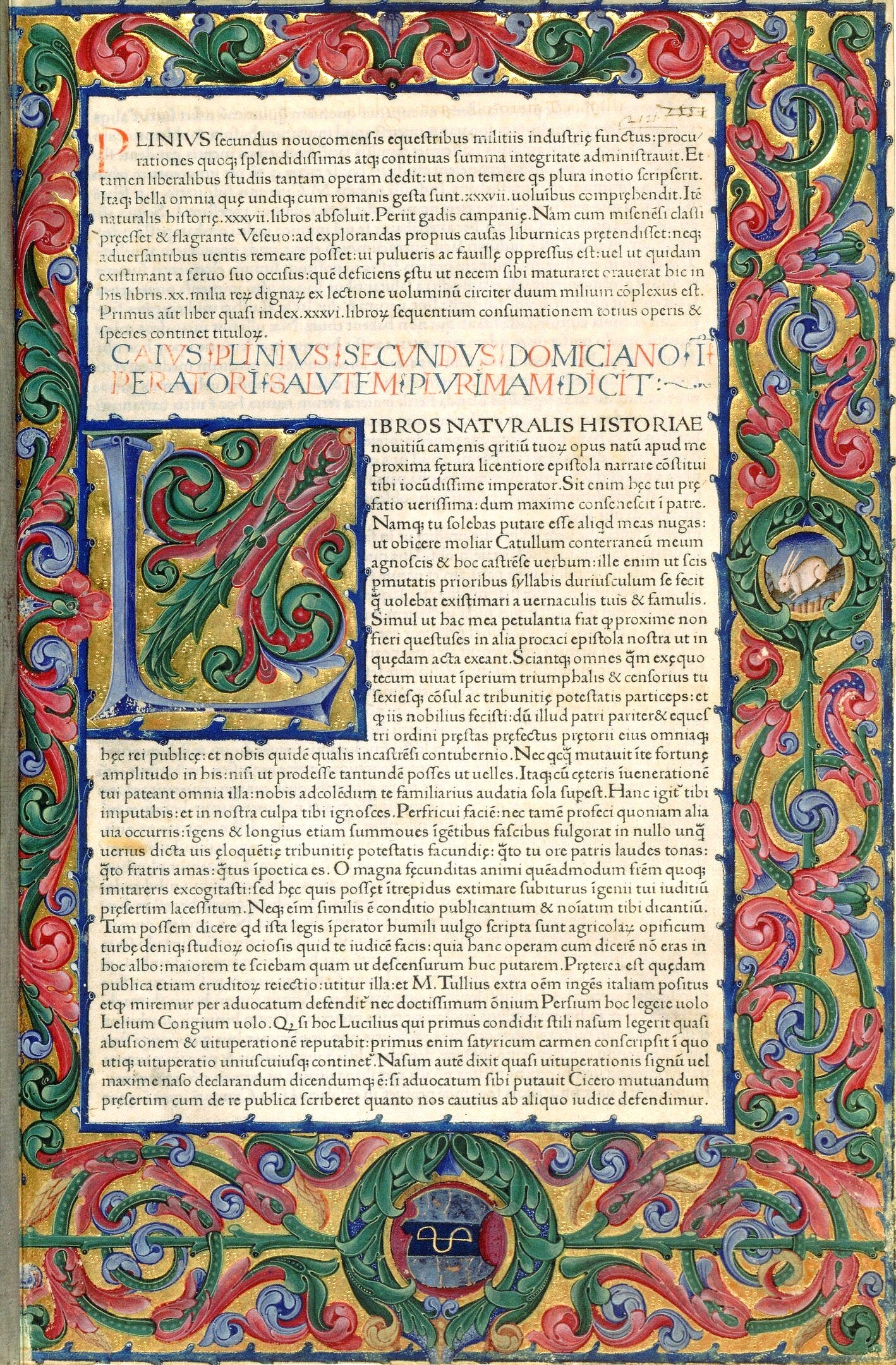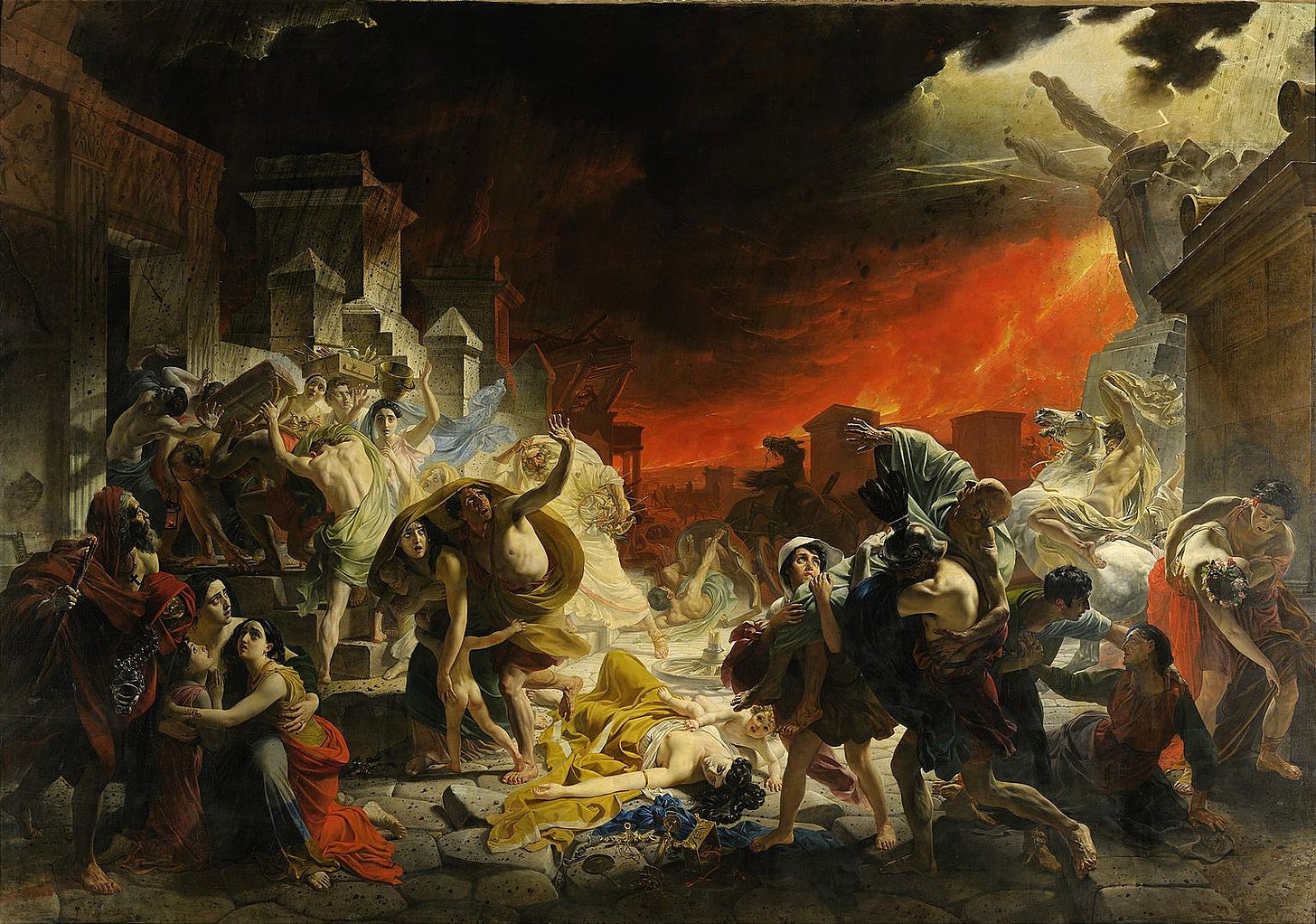Daring in the Face of Death
Heroism at the destruction of Pompeii…
The earth shakes. The sky turns black. Ash rains from the heavens like a storm of death. As terrified Romans scramble to flee, one man stands on the shore of the Bay of Naples, watching the horizon burn.
He puts out the order to launch his fleet — but incredibly, he doesn’t sail away from the disaster. He instead does the unthinkable, and heads straight toward the eruption.
But the man in question is no daredevil. In fact, he is one of the most respected men in the Roman Empire. At 56 years old, he has already established his legacy as a famous author, philosopher, scholar, and statesman.
His name is Pliny the Elder.
Pliny is a man with nothing to gain, and everything to lose, by sailing headfirst into danger. Yet that’s exactly what he does. To most people, it seems like a fool’s errand — but there’s something they all miss. Because even though his mission costs him his life, Pliny the Elder’s last stand at Pompeii is the pinnacle of his illustrious career.
Today, we explore Pliny’s courage in the face of chaos, and his dedication to the Roman ideal of officium. It’s an ancient ideal that can teach you about true leadership, and how to survive disaster — even if only through your legacy…
Intellect, Action, Officium
Pliny the Elder was no armchair intellectual. Though best known today for his Natural History — a sweeping 37-volume encyclopedia of the ancient world — his daily life was rooted in discipline, duty, and public service.
He had served in the Roman army, governed provinces, and risen to command the imperial fleet at Misenum, one of the most strategic naval bases in the empire. He woke before dawn, studied while being shaved, dictated while dining, and believed every idle moment was wasted.
As his nephew, Pliny the Younger, wrote: “He was a man of immense curiosity who never let a moment go unused.”
But Pliny wasn’t just curious, he was committed: to Rome, to truth, and to duty. In particular, he sought to live up to the ideal of officium — the Roman virtue of fulfilling one’s obligations, even at personal cost.
Pliny’s adherence to this ideal earned him respect, and even won him the favor of Emperor Vespasian. Yet neither comfort nor status ever softened his sense of duty — for decades, officium shaped his routine. Soon, it would define his legacy.
Because when Vesuvius erupted, everything Pliny believed would be put to the ultimate test…
Into the Inferno
On the morning of August 24, 79 AD, Pliny noticed something strange in the distance — a towering cloud shaped like a pine tree rising above Mount Vesuvius. He watched it from across the bay, intrigued by the scale and shape.
To most, it was terrifying. To the elderly scholar, it was something worth investigating.
But then a message arrived — it was a plea for help from his friend Rectina, trapped in a city near Pompeii and unable to escape. Soon, more reports followed, and Pliny began to realize this eruption was more than just a geological phenomenon.
Immediately, Pliny ordered his fleet to prepare. With officium at the forefront of his mind, he resolved to use the fleet to sail toward the city and evacuate civilians. “He changed his plan,” wrote his nephew, “and what he had begun in a spirit of inquiry, he completed with heroic resolve.”
As Pliny’s ships approached the coast near Stabiae, ash and pumice began to fall. Flames flashed from the mountain, and the sea hissed as burning chunks of volcanic stone crashed into the turbulent waters. Concerned for their safety, his helmsman asked him to turn back the fleet — a request Pliny denied with the famous retort, “fortune favors the bold.”
Upon his arrival, Pliny got to work both evacuating civilians and calming the frightened. But when his own party tried to leave, the winds trapped them on the coast — with heavy hearts, they realized there was no other choice but to stay the evening, and wait for the winds to die down.
An Eternal Legacy
In the midst of chaos, Pliny’s stoic composure became a lifeline. Recognizing that unchecked worry would only make things worse, he spent the rest of evening as if nothing had changed:
In order to lessen the other's fear by showing his own unconcern he asked to be taken to the baths. He bathed and dined, carefree or at least appearing so (which is equally impressive).
-Pliny the Younger to Tacitus
His behavior reassured his companions, and brought a sense of normalcy to the otherwise traumatic course of events. Yet despite his calm, the danger was growing.
By morning, the sky had turned darker still. Ash blanketed the ground. The air grew thick with sulfur and toxic gas. With still no escape by sea, Pliny’s companions attempted to flee on foot — but Pliny, already weakened by age and asthma, succumbed to the fumes.
When they returned to recover his body days later, they found him lying dignified and undisturbed. As his nephew put it:
His body was found untouched, uninjured, and covered, dressed just as he had been in life. The corpse suggested a person asleep rather than a dead man.
In many regards, it was a fitting end. Pliny had not died in confusion, panic, or retreat. He had died as he lived — composed, deliberate, and in service to others.
In the years that followed, his nephew’s letters would preserve not only the story of the eruption, but the character of the man who faced it head on. Through them, Pliny became known not just as an author and admiral, but as a man of officium — a man who chose to act while others fled.
So while the fumes of Vesuvius carried Pliny to death, they simultaneously breathed life into his legacy. It is a legacy which, nearly 2,000 years later, proves he survived the disaster as well as anyone.
Takeaways
1) Act When Others Retreat
Pliny had every excuse to stay behind — his age, his status, the danger ahead. But when others ran, he advanced. Not for glory, but for duty.
When crisis strikes, the instinct to retreat is powerful. But leadership means resisting that instinct. It means stepping forward, even when you have nothing to gain — and everything to lose.
2) Stay Calm to Lead Clearly
In the face of chaos, Pliny didn’t just give orders — he gave composure. Concealing his own potential concerns, his outward calmness was a deliberate effort to steady those around him.
When panic spreads, your mindset becomes contagious. Fear makes others fragile — but poise makes them strong. Sometimes, the greatest service you can offer is the courage to appear unshaken.
3) Let Principle Shape Your Endgame
Pliny didn’t die by accident. He died by choice — a choice to keep serving until the very end.
For him, officium wasn’t a slogan. It was a lifelong discipline, one that dictated how he lived and how he died. Legacy doesn’t stem from survival alone — it stems from acting with honor, when the outcome is no longer in your control.
Want to dive deeper?
This Thursday at 9am ET, James and I go live on X to walk you through the remarkable life of Pliny the Elder. Visit my X account at 9am to access the livestream — once it ends, the stream will be added to our Members-Only Video Archive for you to catch the replay.
Also this Thursday, our premium subscribers will get a deep dive article on what you can learn from Pliny’s life as soldier, statesman, and scholar — if you want to channel the spirit of a Roman polymath, there are few better to learn from than Pliny the Elder.
If you’re not already a premium subscriber, please consider joining below — and don’t forget that members of our Praetorian Guard get 5% off on our summer retreats!
Ad finem fidelis,
-Evan
One last thing…
The following short essay was written by the team at LEGACY — don’t forget to check out their app, as they are doing great work 💪
The Art of Travel
Traveling was once meant to elevate one's soul.
It wasn’t about merely consuming experiences, it was a journey of transformation—an odyssey that shaped character, broadened the mind, and deepened one’s connection to the world.
The great travelers of the past sought wisdom in the ruins of ancient civilizations, found inspiration in unfamiliar cultures, and returned home not just with souvenirs, but with stories, insights, and a new way of seeing the world.
But somewhere along the way, travel lost its soul. The world became mapped, predictable, and curated. Experiences became pre-packaged, and adventure was reduced to mere photo opportunities.
The great Paul Fussell, in Abroad: British Literary Traveling Between the Wars, highlights this issue by distinguishing between the tourist and the traveler.
According to Fussel, the tourist seeks comfort, familiarity, and convenience. The traveler, however, embraces the unknown, relishes discomfort, and most of all, seeks meaning in the places they visit.
Claude Lévi-Strauss took it even further in Tristes Tropiques, lamenting how mass tourism had stripped travel of its essence. He critiques mass tourism for diluting authentic cultural encounters.
He saw the true voyager as someone who immerses themselves in the world—absorbing its history, its people, and its stories.
That’s why LEGACY was created—to restore the art of exploration and transform tourists into true voyagers.
With Legacy, every journey—whether across continents or in your own hometown—becomes a quest for knowledge and discovery.
Each landmark comes with a digital coin or card, and once claimed, it unlocks a bite-sized history or culture lesson tied to that location. It facilitates a sophisticated, adventure-driven experience that rewards real-world exploration with knowledge and collectible treasures.
Travel was never meant to be passive—it was meant to ignite curiosity, challenge perspectives, and leave us transformed.
With Legacy, we’re bringing back the spirit of true exploration. No more passive sightseeing—every journey becomes an adventure, every landmark a lesson, every step a chance to collect history itself.
The age of the voyager is returning. Will you answer the call?








A noble tale well worth the retelling and rehearing. Thank you!